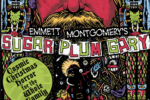At 18th and Union Theatre in Capitol Hill, this weekend just on the cusp of summer, Pacific Play Company has debuted their selection of short original plays compiled within an anthology-style production entitled Summer Magic: Tales of Revenge directed by Buddy Todd. Though these twenty plays differ from each other in many ways, as the title suggests, they are ultimately connected by the transient theme of revenge, which explores the many different manifestations and meanings associated with the act.
Because these plays are only thematically connected, they do not take place in a single setting. The stage, however, remains almost entirely the same: a table and two chairs. While incredibly simple, it’s impressive how much this production manages to do with this setup. It is not only quite creative and efficient, it also works to tie these plays together in an imagined setting. As such, they all seem to occur at a similar time—summer. Some of them explicitly mention this, yet even the ones that don’t still manage to capture the essence of the season in their overall lightheartedness. Even as some of these plays attempt to address more serious situations, the tales of revenge are mostly comedic in nature.
This is certainly the strength of Summer Magic. Both the writing and the performances left the audience consistently laughing. I appreciated how often the actors leaned into the ridiculousness of these scenarios, playing their characters as over-the-top as they were written. For example, Patrick Tolden’s exaggerated expressions and mannerisms were excellent in his portrayals of Jacob and Emmon. His booming voice filled the stage and was always met with laughter in return. Marlena McHenry as Marian played off his energy well, creating both a hilarious and believable dynamic between them. Similarly, Pearl Lam as Jessica demonstrated the comedic range of her character alongside Tolden’s narcissistic Emmon, commanding the stage in the second iteration of “Me 2,” whose play on words equally demonstrates the cleverness of the writing.
Other notable performances included Sonja Usher, who played a charming bride, a skittish podcaster, and a surprisingly relatable and endearing Evil Queen. Her Magic Mirror played by David Breyman perfectly captured their dynamic from the original Snow White in a sincere take on the character. Breyman also won the audience over in his hilarious performance of Chad temping as a witch for a coven out with Covid. This play felt topical and self-aware in the best way. The same is true of “Twenty-Two Stans,” a play about an unsettling interview on a true crime podcast. Carrie Schnelker gave a darkly humorous performance as Ivah the serial killer. She wasn’t afraid to embrace what made the character work, landing the obtuse and mysterious dialogue as well as the scary charm of her weird mannerisms. Her performance left me wanting to see more of the character, which certainly appeals to the cultural fascination with serial killers today. I wish this play had gotten a second part as some of the others had.
This is perhaps one weakness of Summer Magic: some plays were given more time than others, though the reason for doing so was not always clear. In particular, the story of Joe and Mary was given six parts appearing periodically throughout the production. Spreading the story across these parts was helpful in establishing the amount of time that had passed, making this tale of revenge the largest in scope. Marlena McHenry as Mary certainly delivered as a resentful wife driven mad by her incompetent husband. Mark DeJoy as Joe, on the other hand, was questionable. He played the part of an incompetent husband well, but it didn’t always seem to land. His expressions were over-the-top in a way that was comical but didn’t quite make sense for the character or the seriousness of the situation. Perhaps this contrast was the point the play was trying to make, yet it only seemed to muddle the mood for me. This could be an issue with direction, though, as DeJoy’s performance as Kyle was believable, outrageous, and hilarious.
While the serious moments in Summer Magic didn’t always land for me, I appreciate that the collection attempted to show the nuance of revenge by including these elements. For instance, the extended story of Joe and Mary reflects less on revenge as a single event and more on the consequences which extend beyond the act itself. This idea is also evident in “The Rescue.” Cedric Jonathan as Bill truly captured the quiet rage that fueled the tension of the three-part play. Even as his delivery of dialogue elicited laughter from the audience, it was ultimately grounded in the severity of the betrayal that is only vaguely mentioned at first. The guilt that Jeremy, played by David Breyman, comes to display in the final installment illustrates how revenge can be the simple curse of remembering—the pain of regret and survival as its own consequence. In that way, even the weakness of the production was revealed as a strength through its moving message.
Ultimately, Summer Magic: Tales of Revenge lived up to its name. It was a refreshing and comical 90-minute watch perfect for a summer night in June. The theme of revenge managed to capture the heat of the day while cathartically releasing it through humor (and the air-conditioned building). I would recommend this play to anybody looking to enjoy a lighthearted laugh this weekend or next.
Summer Magic: Tales of Revenge Playwright’s Festival, Pacific Play Company, 18th and Union Theatre 1406 -18th Ave, Seattle 98122, (Central District, corner of 18th and Union. Thurs. Fri. Sat. 7:30pm, Sun 6:30 pm. Til July 2. Live or Streaming





















